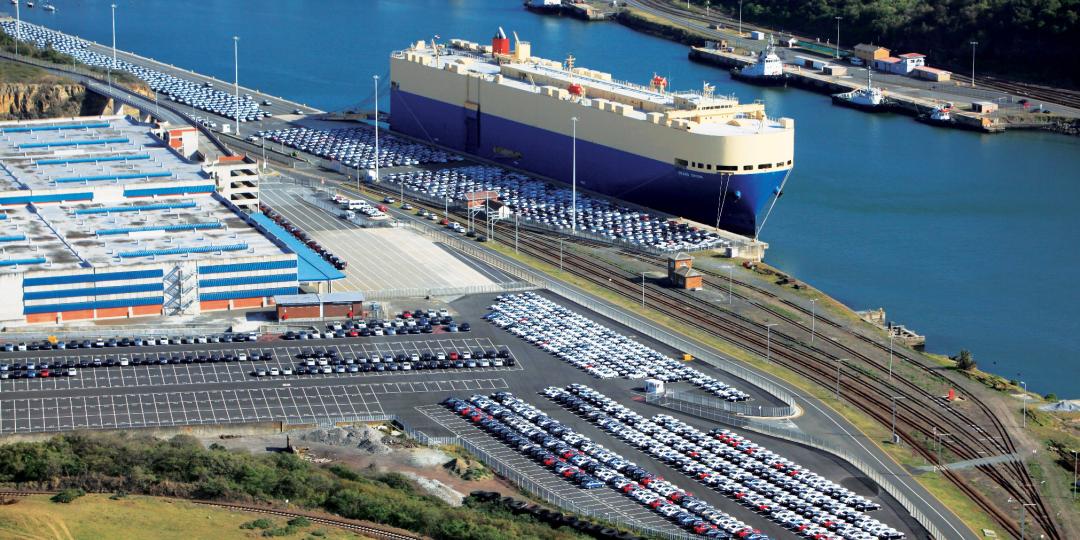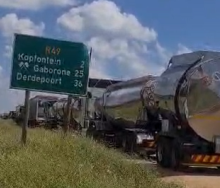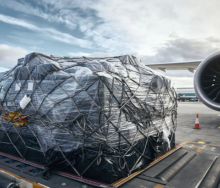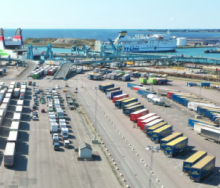Transnet Port Terminals (TPT) has hit a few records in its operations across sectors over the last financial year despite struggling after facing flooding, looting, inclement weather and electricity constraints.
Speaking at the recent Transport Forum, TPT Chief Executive Jabu Mdaki said two of the four sectors in which company operated were at an all-time high. The Transport Forum is an annual collaborative engagement with customers to reflect on the year and share plans for the new financial year that starts in April.
“The automotive and break-bulk sectors are performing exceptionally well, and volumes are higher than they’ve ever been,” said Mdaki.
He added that the automotive terminals would have handled more than 825 000 fully built vehicles by 31 March 2023 and break-bulk volumes would exceed 27 million tons in the same period. The bulk and container sector volumes had remained more or less the same and there was opportunity for a strong finish at the end of the year.
Mdaki said the port had shared its plans to contribute to growing the local economy with port users, at the forum.
“This Transport Forum platform is important as it ensures TPT manages to share its current and future plans with customers, port users and relevant stakeholders in order to contribute to making South Africa globally competitive.”
He said TPT was handling more coal and manganese than it had ever handled in its history, as global demand increased for these commodities.
The heads of TPT in KwaZulu Natal, the Western Cape and Eastern Cape regions detailed plans to better manage infrastructure, maintenance and the supply chain process across eight segments, namely containers, automotive, iron ore, magnetite, manganese, chrome, coal, and breakbulk.
TTP said in a statement that in KwaZulu Natal, the Durban Container Terminals were in the process of procuring additional straddle carriers, while ship-to-shore cranes were undergoing midlife refurbishment in a phased approach. Initiatives such as the driver truck management system were already in place at the terminal to ensure the safe keeping of cargo within premises.
“The implementation of the new free import storage rule last year is also yielding benefits that improve yard fluidity and overall efficiency in the system. The terminals had relooked at the free 72 hours an importer has to collect a container. Previously, the counting of the free 72 hours would start after all containers on a vessel had been offloaded. Now, the counting of the free 72 hours begins 24 hours after a container is discharged from the vessel and placed in the stacking area,” TPT said.
In recent weeks, the terminal had been meeting its contractual obligations with shipping lines and meeting most key performance indicators, the parastatal added.
TPT said the Richards Bay Terminals would soon have an additional conveyor route to increase the offloading capacity of magnetite in addition to a new general-purpose loader.
“Year-to-date volumes were 9% higher at the Bulk Terminals and 44% higher at the Breakbulk Terminal owing to the global coal demand. One of the biggest successes of the terminals was the adoption of reliability-based maintenance, moving from a reactive to proactive maintenance regime that is supported by ownership culture,” TPT said.
The Eastern Cape container terminals moved 31% more container volumes compared with the same period last year, and met budget, despite new European Union cold treatment regulations and limited market access to the Middle and Far East due to vessel omissions.
The East London Terminal is also handling export grain volumes again after the temporary closure of the silo for two years due to low regional volumes. The Nqgura Container Terminal volumes were 20% higher and the Gqeberha Container Terminal volumes were 11% across refrigerated containers. Automotive volumes were higher at the Gqeberha Car Terminal by 34% and 98% at the East London Terminal.
TPT said that in the Western Cape, long-term spares supply contracts for equipment had been awarded as the Cape Town Container Terminal brought back more equipment that had been long-standing due to unavailability of spares.
“This will improve availability and reliability of equipment. Replacement of key equipment for the terminal has also begun, with 20 new trailers already manufactured and delivered by Transnet Engineering (TE). The terminal has shared with stakeholders widely its plans to replace equipment as well as the midlife refurbishment of its ship-to-shore cranes. The terminal is recovering from the impact of heavy winds experienced in the past week,” TPT said.
The inclement weather had resulted in the terminal not being fully operational for 4.5 days, losing up to 108 man working hours. The Saldanha Terminals remain the largest export iron ore facility in Africa, loading more than 8 000 tonnes per hour. The terminal has filed an application to increase volume throughput per annum from 60 million tonnes per annum to 76.













